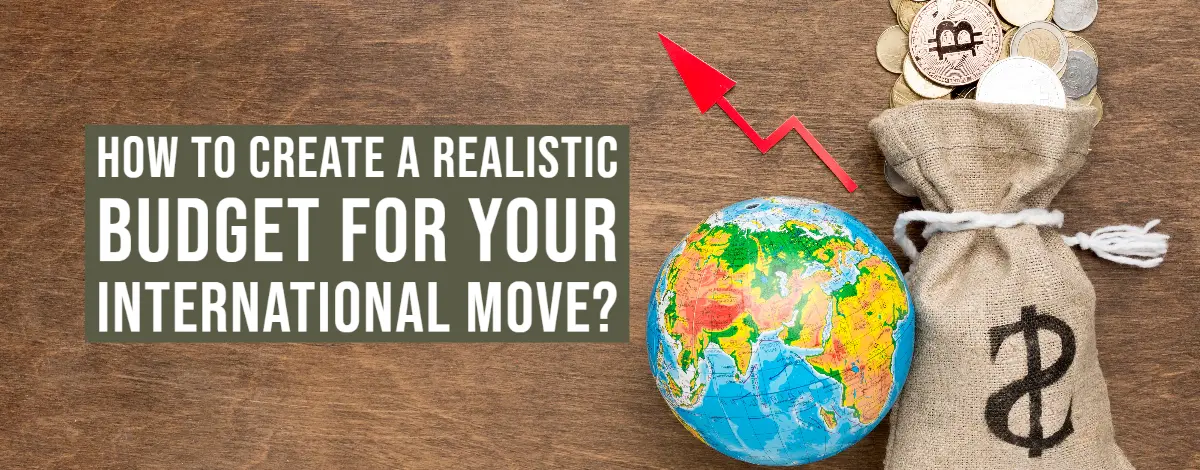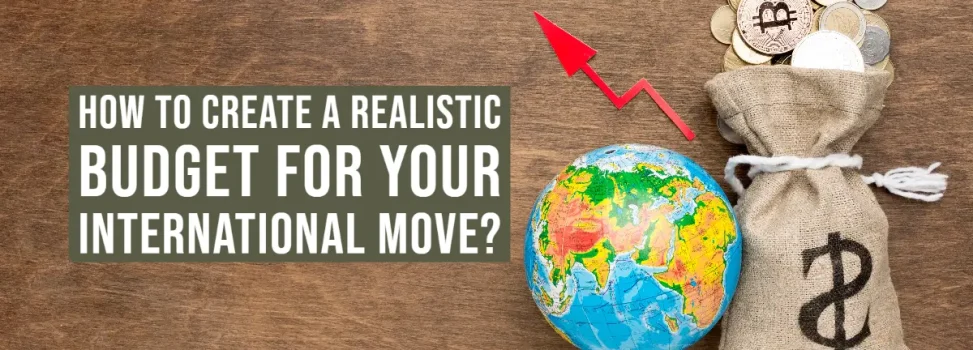Relocating overseas is an incredible journey that many people hope to have, but if you haven’t budgeted for all of the tiny unanticipated expenses associated with such a journey, they may begin to add up. Here are our suggestions for setting up and adhering to an international moving budget.
By identifying your objectives, create a budget for your International Move:
You must first conduct some study. Do your best to learn everything you can about your new house. Verify the cost of existence, rental rates, and other factors. It’s also crucial to consider your motivation for moving.
You can depend on your wage if you’re relocating for a job. Find out how much you will have to spend on things like taxes, housing, and other expenses. Then, determine if you can survive for a month on the funds that are left.
Making a budget for your international move is necessary if, meanwhile, you intend to freelance throughout your stay.
Do the maths for your monthly costs. You must also research how much money you might make working as an independent contractor abroad in the nation of your choice.
Since so many people enjoy sharing their international living experiences, this is a rather simple task. So, simply search on Google or even YouTube.
Creating a worksheet:
The moment has come to become more familiar with your worksheet program. Your budget doesn’t have to be complicated to achieve what you require it to do: give you an accurate representation of your expenditures and financial requirements.
How to set a budget for your international move:
Financially speaking, relocating to another nation may seem like a terrific option. Work visas and visas for digital nomads allow you to make money while traveling more. Permanent immigration can lead to new opportunities in life and work.
Additionally, you can find an ideal location with a lower cost of residing with a retiree visa. You must make investments in an international move, which involves costs, to get this to happen. When you plan a move overseas, you anticipate and accumulate funds for those expenses.
Consider these aspects of finances and way of life to determine the budget that is best for you.
Find out what it costs to live:
The online world today makes it simple to investigate the cost of living for the majority of nations. Travel bloggers write posts regarding their expenses. Digital grocery stores and menus are available.
You can conduct thorough searches on real estate websites for all types of housing. Depending on where you’re going, you should base your moving budget on it. Many places offer excellent culture along with a low cost of living.
If you want to lower your expenses for necessities while still being close to the cities, you can think about moving to a foreign country.
Verify whether your visa calls for evidence of finances or a record of income:
Do you require income or savings to obtain a visa? Some nations demand money before allowing you to immigrate permanently or just temporarily. This is frequently known as proof of funds. The majority of visas for digital nomads demand either financial or wage documentation.
Either of these guarantees that you will be able to support yourself and the community where you are going. The figures for evidence of money or income are a helpful resource for figuring out the cost of residing in the place you’re going and creating a budget.
You will have an appropriate budget if it matches or exceeds these needs.
Think about the way of life you wish for:
What sort of lifestyle are you looking for where you’re going? Some ex-pats enjoy leading frugal lives while they travel. Former employees or freelancers frequently look for places with low cost of existence.
Others desire a similar way of life to what they have “at residence,” or they desire additional benefits like traveling or residing in a well-known area while they are away.
The cost of traveling home for visits while staying abroad permanently is a lifestyle expenditure that ex-pats might overlook. Include a trip home a couple of times per year in your budget if you anticipate doing so. To make it happen, you might need to modify your lifestyle abroad.
Considering the cost of insurance and medical care:
Pick your insurance and medical treatment according to what you’ll require there. Mobile workers and people on work visas typically have to show proof of medical coverage.
Regardless of demands, insurance lessens the strain of a cross-border transfer. Having good health insurance prevents medical issues from ruining your trip. You can get more assistance in the event of crises and theft due to travel protection. You can discover coverage that fits your budget with the aid of a reputable insurance agent.
Make an immediate fund arrangement:
Any unforeseen occurrences can be covered with emergency money. Consider what an emergency might be for you while creating a budget for your emergency savings.
Cover part of the expenses associated with theft or healthcare if you selected a high deductible insurance scheme. If seeing your family again is vital to you, set aside money so that you may purchase a plane ticket at any moment.
Travel expenses:
The majority of individuals prioritize travel expenses when planning an international transfer and for a valid purpose. Here are all the expenses to think about.
- Airline ticket: Purchase it long in advance because it will be less expensive if you do it months ahead of time.
- Transportation costs: Such as those for buses, trains, and rental cars to and from airports
- Lodging: If you have already rented a home in your new nation, there won’t be any issues. If the same location is not yet ready, try looking for inexpensive lodgings.
- Food: Bring refreshments with you on the journey and set aside some cash to eat at the airport.
- Passports and visas: Verify that your passport, visa, and other necessary paperwork are all current and will not expire within the next six months.
- Vaccination: Check your vaccination status to check whether you require to get any shots before entering the country.
Extra expenses to factor into your moving budget include:
Many of the expenses associated with a move abroad are typical, such as visa fees and airfare. You have options regarding several potentially expensive areas, including bringing your possessions and your pets.
Move your belongings:
The cost of moving items overseas increases with the quantity and weight of your possessions. Moving “everything” can help you avoid having to buy furniture or electronics again.
However, homes in foreign countries frequently have electrical outlets that are various shapes, so your things might not function or might not fit.
Additionally, if you are transporting private items of a specific value, particularly vehicles, you might have to pay customs duty. If you are permanently relocating abroad, use the opportunity to thoroughly purge.
Relocating with pets:
A pet relocating internationally may incur additional costs. The process of getting a pet that is medically okay to go abroad might take up to six months and several visits to the vet.
Additionally, some locations demand that pets be quarantined at the owner’s expense. As an illustration, there are quarantine and import fees associated with bringing a dog or cat to a foreign country.
If transporting your pets is a top priority, consider locations where importing pets is simpler.
Covering your expenses:
Your company can pay for many of your international moving expenses if you are lucky enough to land an employment opportunity in another nation. Even if they do, you will still incur expenses related to your possessions and daily living in your country of origin, such as long-term storage.
You should probably set aside money for the things you like, which keeps you at ease in addition to what your employer will pay for the relocation.

Making a moving budget will assist you in imagining how your life will be in your new country. You’ll come across unexpectedly intriguing stuff and fresh opportunities. Additionally, finding out what you’ll like will motivate you to start saving the money you require.
FAQs on Creating a Realistic Budget for Your International Move
1. Avoid making too many payments in advance. You can end up paying more money if you do this.
Money is king.
3. Reserve a room directly.
4. Take the bus or train.
5. Be adaptable.
6. Be aware of flash sales.
7. Be Efficient.
8. Consider getting a fresh credit card.
Sea freight must be the primary option when searching for the most affordable method of moving your possessions because the price of international container shipment is significantly cheaper. Air freight is approximately 11–15 times more expensive than sea freight.
1. Begin the task early.
2. Speak with an immigration specialist.
3. Take care of housing.
4. Look up international moving firms.
5. Review tax regulations.
6. Think about your medical alternatives.
7. Gather your papers.
8. Records regarding pets.
9. Vaccinations.
10. Obtaining money.
11. Access to a cell phone.


